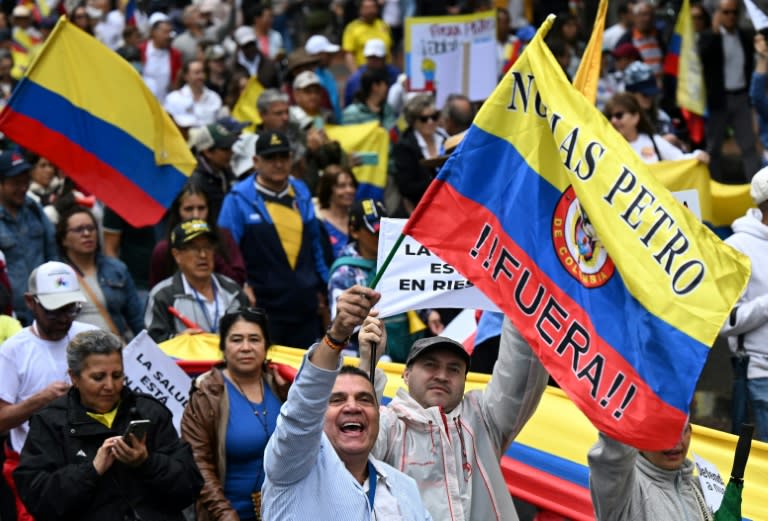Hundreds of thousands turn out in Colombia to protest Petro

Hundreds of thousands of people took to the streets of Colombia's main cities on Sunday to protest against the left-wing government of Gustavo Petro, whose popularity is at an all-time low.
The demonstrations were not the first against Petro since he came to power 20 months ago, but they were easily the largest.
Shouts of "Petro out!" rang through the streets of cities across the country.
Medical associations, opposition groups, and even former allies of Petro had urged Colombians to show up in protest both against reforms Petro is trying to implement, including to nationalize health services, and against violence that continues to mar the troubled peace talks with armed guerrilla groups.
"I voted for change, for Petro, but we're still in the same situation. I'm demonstrating because I think Colombia still has hope and because I love my country," Martha Estrada, a 64-year-old pensioner wearing a tricolor hat in Bogota, told AFP.
Petro, commenting on X, formerly Twitter, said the protests were large in Medellin, Bogota and Bucaramanga but "weak" in 18 other cities.
"The main goal of the marches is to shout 'Petro Out' and to topple the government," Petro said, calling the protests a "soft coup" to thwart reforms. He called for a massive pro-government march on May 1.
In the capital, tens of thousands of demonstrators braved heavy rain to make their way to Bolivar Square, near the presidential palace.
Many waved Colombian flags, while white-shirted doctors and health workers carried banners protesting Petro's healthcare reforms, which have proved a lightning rod for criticism.
The president wants to reduce the role of private companies as health service providers.
"I am here as a citizen, a doctor and a Colombian," 35-year-old Julio Rivero told AFP in Bogota. "As a doctor, we see the deterioration, because there are no drugs to give our patients, and because patients face delays in getting treatment."
Experts agree that the healthcare system is in trouble and needs to be reformed, but some question how the government intends to do so.
Meantime, Petro's ambitious policy of "total peace" -- attempting to bring a final end to six decades of armed conflict -- has also faced reversals.
Concessions to armed groups have been controversial, with frequent violations reported.
Seventy percent of Colombians say the situation in the country "is getting worse," according to the Invamer polling group.
"This man protects the criminals of the guerrilla more than the good people of this country," said 67-year-old protester Betty Ospina.
Petro came to power in 2022 as the first leftist to govern a country traditionally run by conservative elites.
But he lost majorities in the legislature a few months after his inauguration, and his approval rating has plummeted.
bur-lv-ial/oaa/st/bbk/tjj/caw


